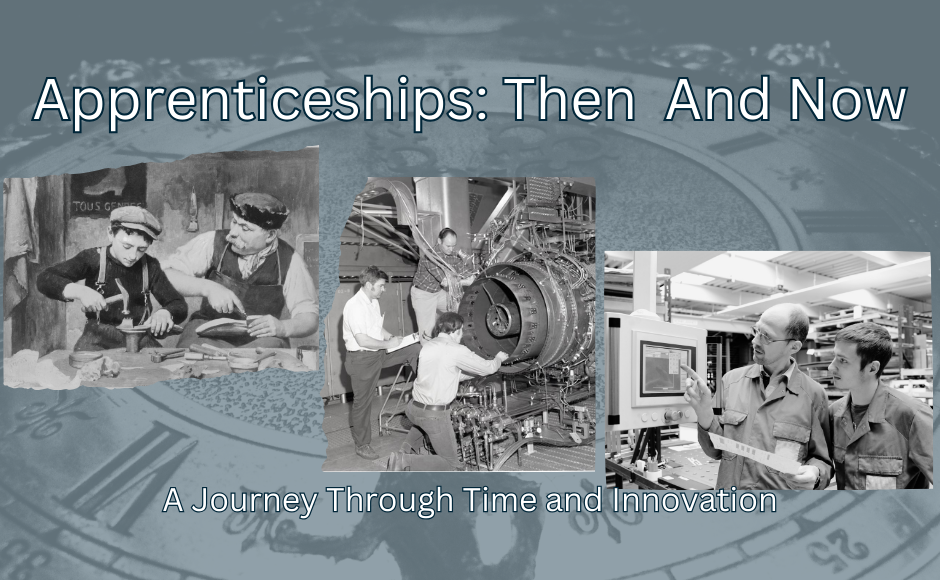
Apprenticeships Then and Now: A Journey Through Time and Innovation
Apprenticeships are amazing!
They’ve been shaping industries and changing lives for centuries, giving people, in particular the young, the opportunity to learn in another way, away from the standard classroom.
We can trace their origins to the Middle Ages, where the parents or guardians of a minor would agree with a master craftsman the conditions for an apprenticeship. This contract would then bind the young person for 5–9 years (e.g., from age 14 to 21). Apprentices' families would sometimes pay a "premium" or fee to the craftsman and the contract would usually be recorded in a written contract.
Like those original contracts today’s modern apprenticeships are at the heart of skill development. Over time, they’ve evolved to match the needs of emerging industries, proving they’re as adaptable as they are essential.
The Rise and Decline of Modern Apprenticeships
Over the next few centuries, other than a few changes in agreements over payments to the worker and the trainer very little changed, although during the industrial revolution the need to have formal training in several industries was removed in law.
The introduction of the Industrial Training Act in 1964 marked a significant turning point. This act aimed to address skill shortages by ensuring an adequate supply of training at all levels, improving both the quality and quantity of training, and sharing the costs of training among employers. It established Industry Training Boards (ITBs), which worked to maintain a strong pipeline of talent in traditionally skilled occupations and higher technician and engineering professions.
This act meant that during the 1960s and 70s, apprenticeships were at their peak in the UK, forming a critical pathway into employment for thousands of young people. However, by the late 1980s and 1990s, their prevalence declined significantly. This drop was largely due to shifting economic priorities, reductions in government funding, and a growing emphasis on academic education over vocational training. Employers also faced financial pressures, leading many to scale back their apprenticeship programs.
This decline created a skills gap, particularly in industries like engineering, manufacturing, and automotive, where hands-on experience is essential. The lack of investment during this period has resulted in a retiring workforce with fewer qualified individuals ready to step into their roles.
The Revival of Apprenticeships
Recognising the skills gap and the need for a well-trained workforce, the UK government and industry leaders began to reintroduce and modernise apprenticeship schemes in the 2000s. These programs were redesigned to align with contemporary industry needs, incorporating advanced technologies and broader career pathways.
Today, apprenticeships are once again a vital component of workforce development. They provide individuals with the opportunity to earn while they learn, gaining valuable hands-on experience and industry-recognised qualifications. For employers, apprenticeships offer a way to develop loyal, highly skilled teams tailored to their specific needs.
Skills for Life: The Theme of Apprenticeship Week
This year’s Apprenticeship Week focuses on "Skills for Life," a theme that reflects the core purpose of apprenticeships. These programs don’t just equip individuals with technical expertise, they also teach critical transferable skills such as problem-solving, communication, and adaptability. These are the skills that last a lifetime, preparing apprentices not just for their first job but for a fulfilling and dynamic career.
At MPI, we believe in the transformative power of these life-long skills. Whether it’s through supporting our clients’ apprenticeship schemes or developing talent within our own organisation, we see the lasting impact of these programs every day.
The Benefits of Apprenticeships
Apprenticeships offer numerous advantages for both individuals and businesses. For apprentices, they provide a direct route into employment, reducing the burden of student debt while developing practical skills. For employers, apprenticeships ensure a steady pipeline of talent, up to and including degree level, helping to bridge the skills gap and drive innovation.
From improved productivity to increased employee retention, the benefits of apprenticeships extend far beyond the immediate. They encourage a culture of continuous learning and development, which is critical in an ever-evolving job market.
MPI’s Commitment to Apprenticeships
At MPI, we are proud to play an active role in the resurgence of apprenticeships. Over the years, we have partnered with clients to sponsor apprenticeships through their internal schemes, allowing a larger pool of skilled professionals to enter the industry. By investing in these programs, we not only support our clients’ growth but also contribute to the sustainability of key industries.
Internally, MPI has embraced apprenticeships to both recruit new talent and upskill existing staff. These apprentices bring fresh ideas, energy, and enthusiasm to our team. Through upskilling, we not only empower our team members to build fulfilling careers but also ensure we retain the talented individuals we value so highly. By nurturing their potential, we’re helping them grow into confident, skilled professionals who are integral to our success.
The Future of Apprenticeships at MPI
Looking ahead, MPI remains committed to fostering talent through apprenticeships. While the specifics of our future plans will adapt to industry needs and opportunities, we aim to continue supporting both internal development and our clients' schemes. Apprenticeships will remain a vital part of our approach to workforce growth, ensuring we contribute to a skilled and adaptable talent pool for years to come.
Apprenticeships are more than just a training program; they are a bridge to the future. At MPI, we are honoured to contribute to this legacy, shaping the workforce of tomorrow through dedication, collaboration, and innovation.
As we celebrate Apprenticeship Week, let’s remember the enduring value of "Skills for Life" and the vital role apprenticeships play in building a resilient, skilled, and innovative workforce.
